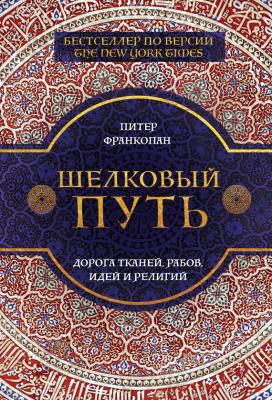Шелковый путь. Дорога тканей, рабов, идей и религий. Питер Франкопан
Читать онлайн.| Название | Шелковый путь. Дорога тканей, рабов, идей и религий |
|---|---|
| Автор произведения | Питер Франкопан |
| Жанр | Прочая образовательная литература |
| Серия | Путешественники во времени |
| Издательство | Прочая образовательная литература |
| Год выпуска | 2015 |
| isbn | 978-5-699-95706-4 |
504
J. Darrouzès, Notitiae Episcopatuum Ecclesiae Constantinopolitanae (Paris, 1981), рр. 31–32, 241–242, 245.
505
Istakhrī, ‘Book of Roads and Kingdoms’, рр. 154–155.
506
Mason, ‘The Religious Beliefs of the Khazars’, р. 411.
507
C. Zuckerman, ‘On the Date of the Khazars’ Conversion to Judaism and the Chronology of the Kings of the Rus’ Oleg and Igor: A Study of the Anonymous Khazar Letter from the Genizah of Cairo’, Revue des Etudes Byzantines 53 (1995), р. 245.
508
Там же, с. 243–244. О заимствованиях из письма Константина – P. Meyvaert and P. Devos, ‘Trois énigmes cyrillo-méthodiennes de la “Légende Italique” résolues grâce à un document inédit’, Analecta Bollandiana 75 (1955), рр. 433–440.
509
Лавров П. Материалы по истории возникновения древней славянской письменности. – Л., 1930. – С. 21; F. Butler, ‘The Representation of Oral Culture in the Vita Constantini’, Slavic and East European Review 39.3 (1995), р. 372.
510
‘The Letter of Rabbi Hasdai’, in J. Rader Marcus (ed.), The Jew in the Medieval World (Cincinnati, 1999), рр. 227–228. Также см. здесь N. Golb and O. Pritsak (eds), Khazarian Hebrew Documents of the Tenth Century (London, 1982).
511
‘The Letter of Joseph the King’, in J. Rader Marcus (ed.), The Jew in the Medieval World, р. 300. Обсуждение даты и контекста – Р. Golden, ‘The Conversion of the Khazars to Judaism’, in Golden, Ben-Shammai and Róna-Tas, World of the Khazars, рр. 123–162.
512
R. Kovalev, ‘Creating “Khazar Identity” through Coins – the “Special Issue” Dirhams of 837/8’, in F. Curta (ed.), East Central and Eastern Europe in the Early Middle Ages (Ann Arbor, 2005), рр. 220–253. Об изменении практики погребения – V. Petrukhin, ‘The Decline and Legacy of Khazaria’, in Р. Urbanczyk (ed.), Europe around the Year 1000 (Warsaw, 2001), рр. 109–122.
513
Qurʾān, 2.285, р. 48; 3.84, р. 60.
514
Zuckerman, ‘On the Date of the Khazars’ Conversion’, р. 241, а также Golb and Pritsak, Khazarian Hebrew Documents, р. 130.
515
Masʿūdī, ‘Meadows of Gold’, р. 132; об элите Иудаизма – Mason, ‘The Religious Beliefs of the Khazars’, рр. 383–415.
516
Pritsak and Golb, Khazarian Hebrew Documents; Masʿūdī, ‘Meadows of Gold’, р. 133; Istakhrī, ‘Book of Roads and Kingdoms’, р. 154.
517
Ibn Khurradādhbih, ‘Book of Roads and Kingdoms’, р. 110.
518
Там же, рр. 111–112.
519
Там же, р. 112.
520
Ibn al-Faqīh, ‘Book of Countries’, р. 114.
521
Луитпранд Кремонский, посетивший Константинополь в десятом веке, думал, что название «русы» произошло от греческого слово rousios, или красный, из-за отличительного цвета их волос, The Complete Works of Liudprand of Cremona, tr. Р. Squatriti (Washington, DC, 2007), 5.15, р. 179. Фактически слово происходит от скандинавских слов roþrsmenn и roðr, означающих ряд. S. Ekbo, ‘Finnish Ruotsi and Swedish Roslagen – What Sort of Connection?’, Medieval Scandinavia 13 (2000), рр. 64–69; W. Duczko, Viking Rus: Studies on the Presence of Scandinavians in Eastern Europe (Leiden, 2004), рр. 22–23.
522
S. Franklin and J. Shepard, The Emergence of Rus’ 750–1200 (London, 1996).
523
Constantine Porphyrogenitus, De Administrando Imperio, 9, рр. 58–62.
524
De Administrando Imperio, 9, р. 60.
525
Ibn Rusta, Kitāb al-aʿlāq an-nafīsa, tr. Lunde and Stone, ‘Book of Precious Gems’, in Land of Darkness, р. 127.
526
Ibn Faḍlān, ‘Book of Ahmad ibn Faḍlān’, р. 45.
527
Ibn Rusta, ‘Book of Precious Gems’, р. 127.
528
Ibn Faḍlān, ‘Book of Ahmad ibn Faḍlān’, рр. 46–49.
529
A. Winroth, The Conversion of Scandinavia (New Haven, 2012), рр. 78–79.
530
M. Bogucki, ‘The Beginning of the Dirham Import to the Baltic Sea and the Question of the Early Emporia’, in A. Bitner-Wróblewska and U. Lund-Hansen (eds), Worlds Apart? Contacts across the Baltic Sea in the Iron Age: Network Denmark-Poland 2005–2008 (Copenhagen, 2010), рр. 351–361. О Швеции – I. Hammarberg, Byzantine Coin Finds in Sweden (1989); C. von Heijne, Särpräglat. Vikingatida och tidigmedeltida myntfynd från Danmark, Skåne, Blekinge och Halland (ca. 800–1130) (Stockholm, 2004).
531
T. Noonan, ‘Why Dirhams First Reached Russia: The Role of Arab-Khazar Relations in the Development of the Earliest Islamic Trade with Eastern Europe’, Archivum Eurasiae Medii Aevi 4 (1984), рр. 151–182, и см., главным образом, T. Noonan, ‘Dirham Exports to the Baltic in the Viking Age’, in K. Jonsson and B. Malmer (eds), Sigtuna Papers: Proceedings of the Sigtuna Symposium on Viking-Age Coinage 1–4 June 1989 (Stockholm, 1990), рр.
